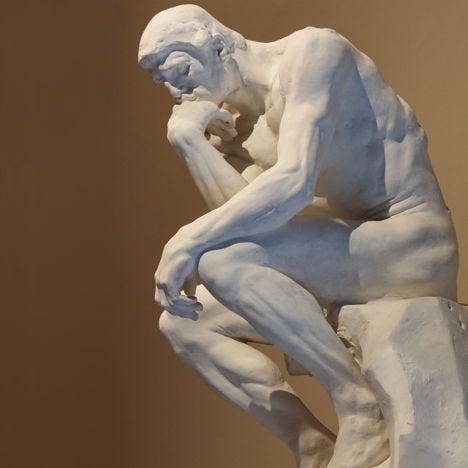“Your subconscious mind is trying to help you all the time.”
— Jim Harrison, poet and novelist
Discussions about the unconscious have grown from Freud and Jung’s work of 100 years ago. It’s been reinterpreted by therapists but it’s disregarded in social conversation. We rarely talk about it and it hasn’t moved our thinking forward.
The unconscious was supposed to be an area somewhere between what we couldn’t think about and what we wouldn’t think about. A kind of controlling, underlying program of uncertain origins.
This was before we knew much about brain physiology. We still don’t know much about brain physiology, but we know enough to discard this early view of the unconscious. It drives me crazy that no one has.
In this early view, the unconscious is all your attitudes that you are unaware of or can’t control. In this picture, consciousness equals awareness, awareness is reality, and reality is fixed. But awareness is not fixed and reality is subjective, so this view of the unconscious is not a useful way of thinking.
Psychologists still adopt this view of the unconscious mind because, on one hand, they don’t understand the models, means, and methods of neuropsychology. On the other hand, psychology is still stuck in the mechanistic model of “objective science.” Psychologists are still stuck in their rational minds, as are most people.
There is no “objective” science. Objectivity went out the window at the same time Freud was shoehorning psychology into it. Your mind does not work objectively. The idea is ludicrous. It will be in your best interests if you think more broadly.
The Unconscious Defined
Let’s start here: your unconscious mind is a container whose moving boundaries encompass all that you do without conscious thought. You can penetrate this boundary to some extent, but it takes effort and you cannot get far.
You can raise and lower your pulse, dilate and constrict your blood vessels, focus on improving your posture, gait, and balance. You’re limited in how much you can accomplish and you certainly cannot take permanent responsibility in any of these activities.
You can sharpen unconscious skills by sharpening your strength and reflexes, increasing sensitivity, changing your focus, improving your memory, and enlarging your awareness. In this way you can gain new physical and mental abilities. It’s unlikely that you’ll be in conscious control of your new abilities as they’ll appear intuitive, inspired, or automatic, but you will be able to apply them.
Examples of becoming conscious of new unconscious skills include ability in sport, music, speaking, and writing. You can point to the study and practice that contributed to your progress, but you can’t say exactly what you’ve gained. In sport and music, for example, what was previously unskilled is now skilled, but it’s still unconscious.
Most refinable unconscious skills are muscular and neurological, having to do with sense and action. Learning to ski, play the piano, or perform gymnastics are primarily physical activities. However, to attain higher levels of performance requires mental involvement that goes beyond what’s unconscious to include elements of our subconscious.
The Subconscious Defined
Learning a new skill may begin with directing your attention to unconscious behaviors, like movement and sensitivity, but to imbue those skills with the sophisticated qualities of grace and harmony requires more than mechanical ability. It requires something aesthetic, and that level of artistry engages our subconscious. Artistry is something we have to remember.
The subconscious is a realm of memory, and memories are of many kinds. They include attitudes, stages of our personalities, and dormant ways of being. We have memories of events, called episodic memories, short-term memories of things and ideas, as well as emotional memories and traumatic memories.
The mystery of memory is where it’s stored and how it’s recalled. During most of our conscious, waking hours we access an infinitesimally small part of our memory, but we recollect almost instantly. On the other hand, some memories are evasive, distant, repressed, or almost gone.
Therapists Stan and Christina Grof assert we have birth memories which, while not episodic, are embedded in our character. Our immune system remembers how to destroy pathogens it has encountered before. Our unconscious mind is also rooted in memory, but of a more metabolic kind pertaining to balance, regulation, and response.
If the unconscious reflects our automatic response, think of the subconscious as based on our retrievable memories, or those thoughts and actions that are a consequence of them. Unlike the unconscious, the subconscious can become conscious but this consciousness may not arise as memories, it is more likely to arise as emotions, attitudes, and behaviors.
When the subconscious arises as something we don’t recognize as a memory, we will not be sure what’s arising, or that anything has arisen at all. When we have a change in attitude, a new emotion or thought, our first reaction is to think this is our will. We always like to think we’re in control.
Just as we’re unaware of how we manage our unconscious skills, such as maintaining our balance or digesting food, we’re unaware of how we manage our subconscious skills, such as forming words, recognizing what we see, or assembling thoughts.
Most changes in our mood or behavior are probably not under our control. They are upwellings of our subconscious. We like to think our behavior is under our conscious control, but it’s more likely under the control of our subconscious. This notion of control is vague. It’s something we feel that we have, but can’t prove that we do.
From a functional point of view, the unconscious is more fundamental since everything we do involves some part of our body and our metabolism. But from an organizational point of view, it’s our subconscious that puts together the mental things that form our personality. Our subconscious does not manage our breath, but it decides how to use it.
Navigate Your Life, Open to Subconscious, Schedule a Free Call…
Listen to this episode with a 7-day free trial
Subscribe to Stream of Subconsciousness to listen to this post and get 7 days of free access to the full post archives.














